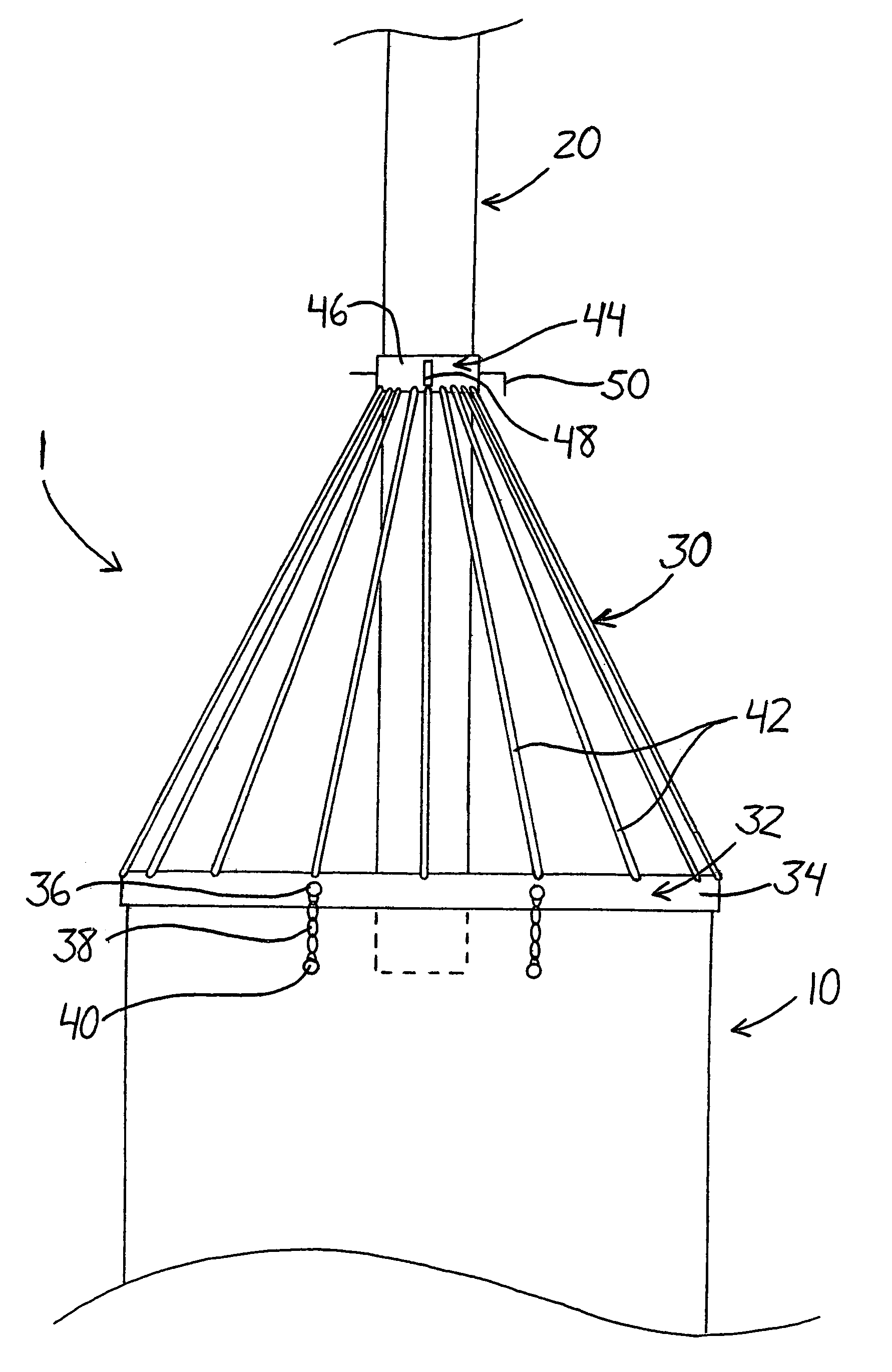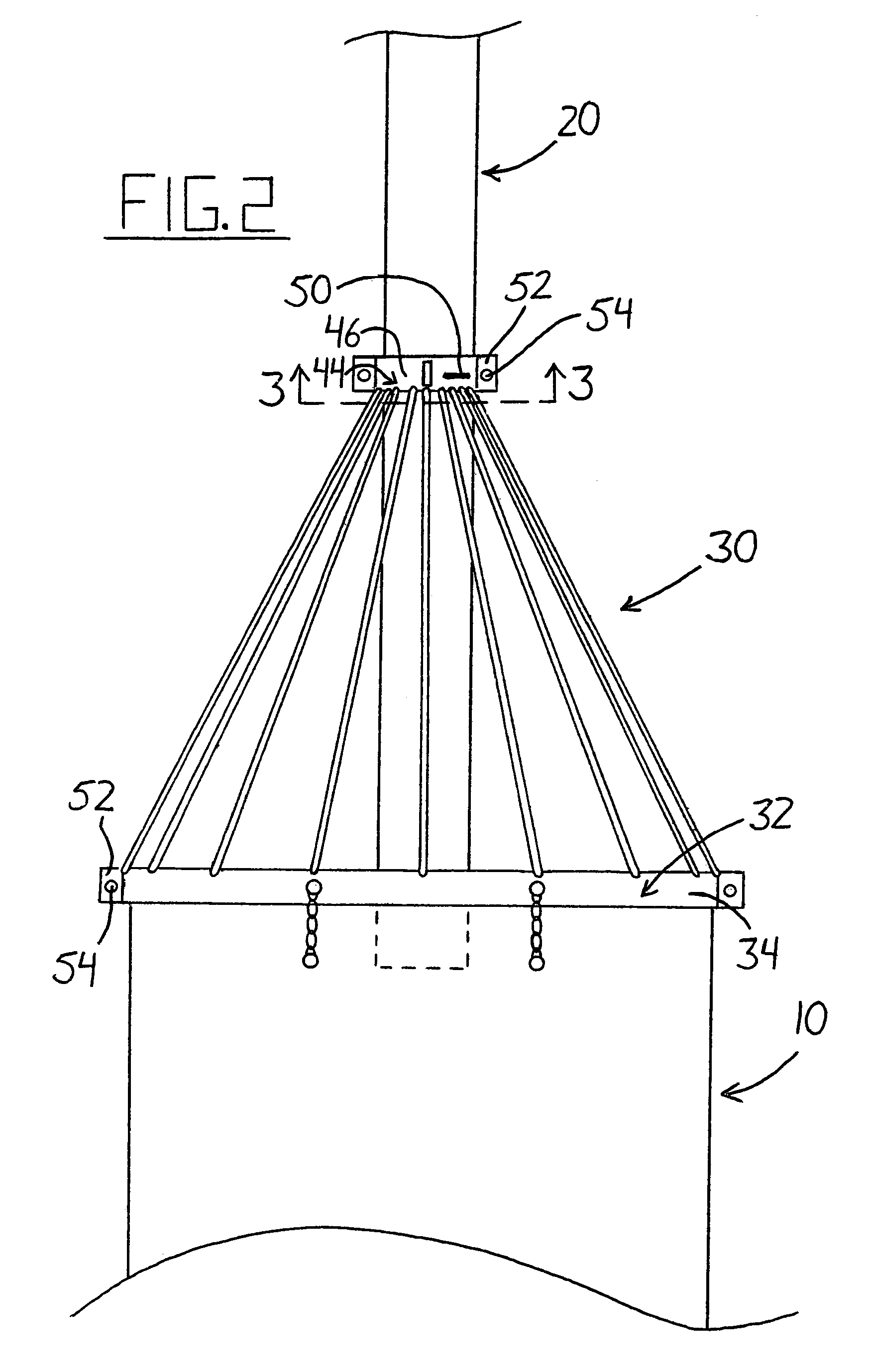Beaver control device for a culvert pipe
a technology for culvert pipes and beavers, which is applied in the direction of artificial water canals, insect catchers and killers, moving filter elements, etc. it can solve the problems of beavers not being able to construct ideal damns, devices that do not discourage beavers from building, and floods and washouts, so as to reduce the number of beavers. , the effect of reducing the number of beavers
- Summary
- Abstract
- Description
- Claims
- Application Information
AI Technical Summary
Benefits of technology
Problems solved by technology
Method used
Image
Examples
first embodiment
[0034]FIG. 1 illustrates the device 1 which is constructed to form a single structure that is installed without further assembly. The base portion 32 has a circular rim 34 which is dimensioned to fit over the end of the culvert pipe 10 such that the opening of the pipe 10 is not blocked in any way by the base portion 32. The base portion 32 is further connected to the culvert pipe 10 by means of two lengths of chain 38 spaced apart near the top of the device 1 and culvert 10. The chains 38 are attached to the base portion 32 by bolts 36 secured through the rim 32. Similarly, the chains 38 are attached to the culvert pipe 10 by means of bolts 40. The chains 38 ensure that the screen 30 remains secured to the culvert 10, but do allow limited motion of the device 1 with respect to the culvert, the purpose of which will be explained below. Similar to the base portion 32, the apex portion 44 has a circular rim 46 which is dimensioned to fit over the end of the weeping tile pipe 20 such t...
second embodiment
[0036]FIG. 2 illustrates the beaver control device 1 in which the screen 30 is made of two pieces which can be assembled on-site. This proves useful for larger applications requiring screens of significant dimensions that may be difficult and / or costly to transport. While having the same general structure as the embodiment of FIG. 1, the difference lies in the rims 34 and 46 of the base portion 32 and apex portion 44 respectively. Here the rims are each made of two semi-circular portions that are detachably coupled together by bolts 54 at flanges 52. FIG. 3 shows a cross section taken along line 3-3 of FIG. 2 near the apex portion 44 which illustrates the two piece construction more clearly. The apex rim 46 is made up of two semicircular apex members 45 and 47. A flange 52 is provided at each end of each member so that when the flanges 52 of members 45 and 47 are aligned, they fit together in a flush manner. The flanges 52 are connected by a bolt 54 and the apex members 45 and 47 co...
PUM
| Property | Measurement | Unit |
|---|---|---|
| length | aaaaa | aaaaa |
| movement | aaaaa | aaaaa |
| distance | aaaaa | aaaaa |
Abstract
Description
Claims
Application Information
 Login to View More
Login to View More - R&D
- Intellectual Property
- Life Sciences
- Materials
- Tech Scout
- Unparalleled Data Quality
- Higher Quality Content
- 60% Fewer Hallucinations
Browse by: Latest US Patents, China's latest patents, Technical Efficacy Thesaurus, Application Domain, Technology Topic, Popular Technical Reports.
© 2025 PatSnap. All rights reserved.Legal|Privacy policy|Modern Slavery Act Transparency Statement|Sitemap|About US| Contact US: help@patsnap.com



